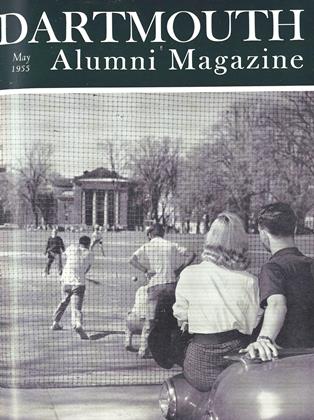By Walter Johnson '37. New York: Alfred A.Knopf, 1955. 172 pp. $2.75.
As he approaches the end of his fast moving account of those doubting months which culminated in the dramatic nomination of Adlai Stevenson in the final steaming days and nights of a Chicago July in 1952, the author assays the forces which brought about what has been described as "the only completely geuine draft" of a candidate for the Presidency of the United States. The author speaks with authority, for he was co-chairman of that little band of determined citizens which, months ahead of the National Conventions and in the face of Governor Stevenson's constant, unequivocal, and insistent disclaimers, launched the movement to accomplish Stevenson's nomination as Democratic candidate for President. The author and his associates, without financial resources and sustained only by a common faith in the Tightness of their cause, breathed strength into the movement day by day, week by week, until as the summer days approached it took on a momentum and a magnitude that finally swept all before it on that fateful third ballot during the evening of Friday, July 25, 1952.
While in retrospect the events which led to this amazing outcome seem to possess the inevitability of a Greek drama, the uncertainties that beset their actual occurrence would have discouraged beyond revival men of lesser will and weaker convictions. Champions of a man, who for admirable reasons not only refused to lift a finger to aid them, but also did all in his power to dissuade them, Mr. Johnson and his fellow crusaders finally built a bicycle into a band wagon. As its pace accelerated and the thundering of its wheels caught the ears of convention delegates from many states the wagon was transformed in the last moments into a triumphal chariot, still driven headlong by the original amateurs but with a hard core of official convention delegates on board and a host of seasoned politicos clinging to its flanks.
The author, who is professor of history at the University of Chicago, speaks modestly of the role of his associates in this tidal movement and even more circumspectly of his own role; but no one can read this exciting account without concluding that the draft of Adlai Stevenson was indeed a miracle wrought of a shoestring by this small and dauntless group.
Mr. Johnson's book though completed nearly three years after the events which it describes is still warm with the heat of the chase. Vivid, staccato yet respectful of fact and judiciously balanced, it has an authenticity that will stir the heart of anyone who has participated in a great national political convention, even in the remote and tenuated capacity that was once this reviewer's lot. Also, it must be admitted that for this reviewer the book has a special significance flowing from a personal friendship with its elusive hero. It was possible thus from the outset to share the author's enthusiasm for his cause and to understand the imperatives that drove him on against the dead weight of any sensible estimate of the chances of success. Professor Johnson not only teaches history; he makes it.
 View Full Issue
View Full Issue
More From This Issue
-
 Feature
FeatureEVEN DISAGREEING WITH HIM WAS PLEASANT
May 1955 By ARTHUR H. LORD '10 -
 Feature
FeatureThe Life of the Mind
May 1955 By DR. ALAN GREGG, -
 Feature
FeatureFreedom and Discipline
May 1955 By AMOS N. BLANDIN JR. 18 -
 Feature
FeatureThe Education of a Freshman
May 1955 -
 Class Notes
Class Notes1918
May 1955 By ERNEST H. EARLEY, RICHARD A. HOLTON -
 Article
ArticleThe Undergraduate Chair
May 1955 By G. H. CASSELS-SMITH '55
RICHARD W. MORIN '24
-
 Letters to the Editor
Letters to the EditorLetters to the Editor
JUNE 1969 -
 Article
ArticleThe College as Mine Host
April 1950 By RICHARD W. MORIN '24 -
 Books
BooksHIGHLIGHTS OF MODERN LITERATURE.
May 1954 By RICHARD W. MORIN '24 -
 Books
BooksLE HIBOU ET LA POUSSIQUETTE.
January 1962 By RICHARD W. MORIN '24 -
 Books
BooksDISCOVERY: THE AUTOBIOGRAPHY OF VILHJALMUR STEFANSSON.
OCTOBER 1964 By RICHARD W. MORIN '24 -
 Article
ArticleThe Constancy of Change, The Constancy of Devotion
July 1974 By RICHARD W. MORIN '24
Books
-
 Books
BooksAlumni Publications
November 1935 -
 Books
BooksALL THE BEST IN SCANDINAVIA.
OCTOBER 1968 By BETTY HOEG HAGEN -
 Books
BooksA Higher Law
December 1978 By CHARLES T. DUNCAN '46 -
 Books
BooksCONTRABAND
June 1936 By Henry M. Dargan -
 Books
BooksNOW IS THE MOMENT,
October 1943 By John G Gazley -
 Books
BooksLooking Out for #1
September 1980 By R.H.R.

